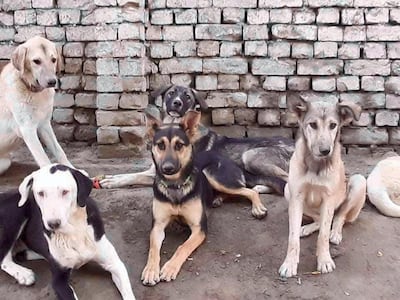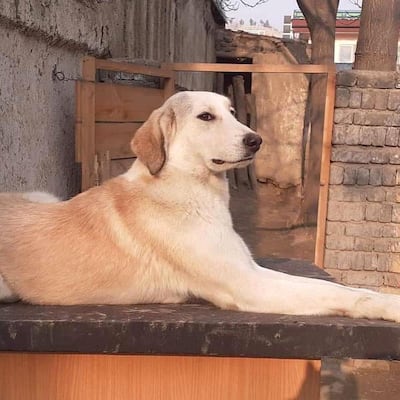Lanny Cordola arrived in Afghanistan in 2016 with nothing but a few belongings, his guitar and a determination to make a difference in the lives of the Afghan children affected by the war.
As well as being a well-known musician from California, he left behind a life of luxury in the US to set up the Miraculous Love Kids (MLK) organisation in Kabul that provided music training to children working on the streets.
Alongside music classes, MLK provides lessons to the children in English and language literacy in Dari and Pashtu, among other subjects. Many of the children face poverty and are out of school, earning daily wages on the streets to support their families.
"Being on the streets of Kabul, these children are vulnerable to the violence. We try to use music to help them heal from the trauma they see and face regularly," Cordola said.

But after four difficult years, Cordola's work has grown increasingly challenging as the security situation in Kabul has worsened. Despite the deal between the US and the Taliban last year and the ongoing process of political settlement with the Afghan government, there has been a substantial increase in daily violence across the country. In the last two weeks of December in Kabul alone, more than 24 civilians were killed and 89 injured in security incidents across the city, Tolo News reported.
"We had to stay under the radar as much as possible – we frequently change times and days of our sessions with the kids. I am also having the kids bring one of their parents to help keep an eye on things," Cordola said.

The widespread violence also limits his mobility in the city.
"The driver I employ has a regular old car, so we can also be less conspicuous while driving through the city," he said. Cordola has had a few threats made against him by unidentified elements. "But that just shows I am doing the right thing".
Cordola is not alone in his experience of dealing with the violence and its impact on social and charitable work.
Several aid workers and NGOs, especially those with international staff that flocked to Afghanistan in the past two decades since the fall of Taliban, are facing increased risks in the current environment.
“Security is a bit more difficult when we are doing animal pickups in the provinces, and the rise in violent crime around Kabul has some effects on how we move around,” said Charlotte Maxwell-Jones, an archaeologist who established Kabul Small Animal Rescue, an animal protection shelter, one of the few in Kabul.

KSAR not only shelters abused and abandoned strays, but is also known for rescuing animals caught in explosions and attacks in the Afghan capital.
"For six months, we were able to move almost no animals out to the home, so the number of animals rose exponentially. It's been incredibly difficult keeping up. We've all been working long hours since we have few full-time staff," Ms Maxwell-Jones said, discussing challenges compounded by the Covid19 pandemic in Afghanistan.
"Animals don't stop getting sick or hit by cars just because humans are in conflict. If anything, it's worse," she said.
With worsening security, international aid to Afghanistan dwindled, forcing many international development projects to close down. Although international donors pledged $12 billion during the recent Geneva Conference in November 2020, the amount was 20 per cent less than that pledged in 2017.
The lack of funding prompted an exodus of foreign workers, and those who remain are working against the tide in an extremely difficult landscape.
“It's hard to parse out the causes of it – Covid, security, US withdrawal and lowered worldwide care for Afghanistan – but yes, our funding has plummeted,” Ms Maxwell-Jones said.
“We struggle daily to come up with money for food, heat, generator fuel, staff salaries,” she said.
Cordola and Ms Maxwell-Jones regularly organise crowdfunding campaigns to help meet the costs of their projects.
Meanwhile, it is feared that the planned and ongoing withdrawal of US troops, as agreed in the US deal with the Taliban, could worsen the situation for the few remaining international activists.
"I am very concerned if the western forces leave – as we both know after the Russians left, mayhem ensued and a horrific civil war emerged that helped create the Taliban," Cordola said, referring to the civil war in Afghanistan in the early 1990s, after the withdrawal of Soviet troops in 1989.
"Of course, the foreign forces situation is a house of cards that is unsustainable," he said.
The nature of his work – music being forbidden by extremist groups such as the Taliban – adds an additional layer of risk for Cordola.
“If the Taliban becomes a bigger presence, we will have to go underground and work with smaller groups and, if need be, slow the music down,” he said. But they wiil, he said, continue to work with children, especially girls, with their education.
The efforts, however, are already taking a toll.
"The kids are more anxious because of the growing instability, uncertainty and a lack of faith in the government. We have regular discussions about their feelings, concerns and plans for the future," Cordola said.
His own future is uncertain. "I do feel a bit more at risk. But as long as I can be of help to the kids I will stay," he said, insisting that he has not thought about leaving.
"In fact the more dark forces strike it strengthens my resolve to entrench myself even deeper," he said.
Ms Maxwell-Jones echoes the sentiment, albeit expressed differently. "I don't feel targeted or threatened. But I think I might be a bit numb to those feelings," she said.
"Would I move to Paris if it were on offer? Yeah, but it's the pull of something else that would cause me to leave here, not a push away from Kabul," she said.
Asked if KSAR would consider shutting down if things worsened, Ms Maxwell-Jones said: "I'm on backup plan number 17 here and there are more where that came from. We haven't considered closing operations."















